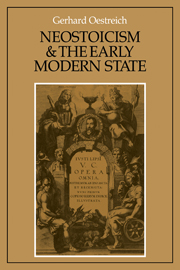Book contents
- Frontmatter
- Contents
- Foreword
- Introduction
- PART I JUSTUS LIPSIUS AND THE NETHERLANDS MOVEMENT
- 1 Constantia in publicis malis
- 2 The political intent in Neostoic philosophy
- 3 The main political work of Lipsius
- 4 Political Neostoicism
- 5 The military renascence
- 6 The European echo
- 7 The Netherlands movement in Brandenburg-Prussia
- PART II THE CONSTITUTIONAL DEVELOPMENT OF THE EARLY MODERN STATE
- Index
4 - Political Neostoicism
Published online by Cambridge University Press: 04 May 2010
- Frontmatter
- Contents
- Foreword
- Introduction
- PART I JUSTUS LIPSIUS AND THE NETHERLANDS MOVEMENT
- 1 Constantia in publicis malis
- 2 The political intent in Neostoic philosophy
- 3 The main political work of Lipsius
- 4 Political Neostoicism
- 5 The military renascence
- 6 The European echo
- 7 The Netherlands movement in Brandenburg-Prussia
- PART II THE CONSTITUTIONAL DEVELOPMENT OF THE EARLY MODERN STATE
- Index
Summary
No attention has hitherto been paid – either in the general history of ideas or in studies relating to the intellectual foundations of the modern state – to the significance and influence of Neostoicism. Interest has centred mainly upon the controversial figure of Machiavelli, his work, his disciples and his opponents. Meanwhile, one important voice has been ignored, yet it was a voice that was able to make itself heard – and heeded – in the period of incipient absolutism, and again in the age of enlightened despotism. True, the Stoic philosophy has been invoked here and there, but only recently has the principal political work of Neostoicism, the Politics of Justus Lipsius, been fully analysed. This is all the more astonishing in view of the rapid, wide and enduring popularity the book achieved. Just before it was published, Bodin's work appeared, in 1576; shortly after, in 1603, that of Althusius. Yet these two achieved only a fraction of the influence destined for Lipsius' work. Of the Latin original there were fifteen editions in the first ten years, from 1589 to 1599. In the same period it was rendered into Dutch, French, English, Polish and German. Spanish and Italian translations followed in 1604, a Hungarian in 1641. Up to the start of the Thirty Years War a new edition left the press almost every year. The seventeenth century saw thirty-one editions of the original, the eighteenth another seven, the last one appearing in Vienna in 1751.
- Type
- Chapter
- Information
- Neostoicism and the Early Modern State , pp. 57 - 75Publisher: Cambridge University PressPrint publication year: 1982
- 1
- Cited by



